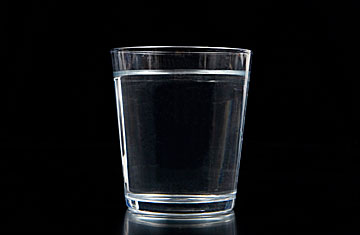

This post is in partnership with Worldcrunch, a new global-news site that translates stories of note in foreign languages into English. The article below was originally published in Süddeutsche Zeitung.
NUREMBERG — Can mineral water, which comes up from the depths of the earth and must simply be filled into bottles, be called "organic"?
Absolutely, says the German firm Lammsbräu. It bottles water from its own springs with labels bearing a house-designed "bio" (organic) seal and sells it under the name of BioKristall. And now the Nuremberg Court of Appeals has given its stamp of (legal) approval. Judge Manfred Schwerdtner ruled that the Lammsbräu water was "different from many other mineral waters," and therefore the description of it fulfilled consumer expectation. The word bio in the name did not suggest some form of state licensing was behind the product, although the court ruled that the company seal, in its resemblance to an existing German eco-seal, could confuse consumers and would have to be changed.
It was nevertheless a victory for the BioKristall producer, which had appealed an earlier court decision in a case brought by the Frankfurt-based Centre for Protection Against Unfair Competition. There could be no such thing as organic water, the court originally ruled, as there were no legal guidelines or other regulations governing its production.
On average, every German drinks 131 L of mineral water a year, up from 40 L in 1980. A spokeswoman for the Verband Deutscher Mineralbrunnen, an association of producers, said that each mineral-water producer tries to distinguish their product by finding a niche centering on "region, special ways of bottling, seals and other marketing means." So far, no one else had come up with organic water, only water mixed with organic products like fruit juice.
German consumer magazine Oeko-Test is skeptical, saying: "Organic water partly fulfills stricter standards, but conventional waters are frequently as good."
Lammsbräu does, however, place great store in the environmental and social implications of its products. The company located in Neumarkt in der Oberpfalz is a pioneer of organic-beer brewing, and in 1992 was the first European brewery to be compliant with E.U. regulations for organic farming. All ingredients used in the beer are from regional organic farms, and brewery trucks use vegetable oil for fuel.
It remains to be seen if consumer-protection groups take the BioKristall case to the country's Supreme Court.
Also from Worldcrunch:
In Mallorca, a Family Feud over Chopin's Piano
— Süddeutsche Zeitung
At Home with Munib Al-Masri, the World's Richest Palestinian
— Le Monde
What Keeps a 100-Year-Old Marathoner Running
— Süddeutsche Zeitung
